2008 年海南高考英语真题及答案
本试卷分第一卷(选择题)和第二卷(非选择题)两部分。考生作答时,将答案答在
答题卡上,在本试卷上答题无效。考试结束后,将本试卷和答题卡一并交回。
注意事项:
第一卷
1. 答题前,考生务必先将自己的姓名、准考证号填写在答题卡上,认真核对条形码上
的姓名、准考证号,并将条形码粘贴在答题卡的指定位置上。
2. 选择题答案使用范围 B 铅笔填涂,如需改动,用橡皮擦干净后,再选涂其它答案标
号;非选择题答案使用 0.5 毫米的黑色中性(签字)笔或碳素笔书写,字体工整、
笔迹清楚。
3. 请按照题号在各题的答题区域(黑色线框)内作答,超出答题区域书写的答案无效。
4. 保持卡面清洁,不折叠,不破损。
第一部分 听力(共两节,满分 30 分)
做题时,请先将答案标在试卷上。听力部分结束前,你将有两分钟的时间将试卷上的答
案转涂到答题卡。
第一节 (共 5 小题;每小题 1.5 分,满分 7.5 分)
听下面 5 段对话。每段对话后有一个小题,从题中所给的 A、B、C 三个选项中选出最佳
选项,并标在试卷的相应位置。听完每段对话后,你都有 10 秒钟的时间来回答有关小题和
阅读下一小题。每段对话仅读一遍。
例:How much is the shirt?
A. £ 19.15.
B. £ 9.15.
C. £ 9.18.
答案是 B。
1. What is the weather like?
A. It’s raining.
B. It’s cloudy.
C. It’s sunny.
2. Who will go to China next month?
A. Lucy.
B. Alice.
C. Richard.
�
3. What are the speakers talking about?
A. The man’s sister.
B. A film.
C. An actor.
4. Where will the speakers meet?
A. In Room 340.
B. In Room 314.
C. In Room 223.
5. Where does the conversation most probably take place?
A. In a restaurant.
B. In an office.
C. At home.
第二节(共 15 小题;每小题 1 分,满分 22.5 分)
听下面 5 段对话或独白。每段对话或独白后有几个小题,从题中所给的 A、B、C 三个
选项中选出最佳选项,并标在试卷的相应位置。听完每段对话或独白前后,你将有时间阅读
各个小题,每小题 5 秒钟;听完后,各小题将给出 5 秒钟的作答时间。每段对话或独白读两
遍。
听第 6 段材料,回答第 6 至 8 题。
6. Why did the woman go to New York?
A. To spend some time with the baby.
B. To look after her sister.
C. To find a new job.
7. How old was the baby when the woman left New York?
A. Two months.
B. Five months.
C. Seven months.
8. What did the woman like doing most with the baby?
A. Holding him.
B. Playing with him.
C. Feeding him.
听第 7 段材料,回答第 9 至 11 题。
9. What are the speakers talking about?
A. A way to improve air quality.
B. A problem with traffic rules.
C. A suggestion for city planning.
10. What does the man suggest?
A. Limiting the use of cars.
B. Encouraging people to talk.
�
C. Warning drivers of air pollution.
11. What does the woman think about the man’s idea?
A. It’s interesting.
B. It’s worth trying.
C. It’s impractical.
听第 8 段材料,回答第 12 至 14 题。
12. How long will the man probably stay in New Zealand?
A. One week.
B. Two weeks.
C. Three weeks.
13. What advice does the woman give to the man?
A. Go to New Zealand after Christmas.
B. Book his flight as soon as
possible.
C. Save more money for his trip.
14. What can we learn about flights to New Zealand at Christmas time?
A. They require early booking.
B. They can be twice as expensive.
C. They are on special offer.
听第 9 段材料,回答第 15 至 17 题。
15. Why did Jane call Mike?
A. To ask him to meet her.
B. To tell him about Tom.
C. To borrow his car.
16. Where will Jane be in about one hour?
A. At Mike’s place.
B. At the airport.
C.
At a garage.
17. What can we infer from the conversation?
A. Jane has just learned to drive.
B. Jane’s car is in bad condition.
C. Mike will go to the airport.
听第 10 段材料,回答第 18 至 20 题。
18. What did the speaker ask the students to do the week before?
A. Write a short story.
B. Prepare for the lesson.
C. Learn
more about the writer.
�
19. Why does the speaker ask the questions?
A. To check the students’ understanding of the story.
B. To draw the students’ attention to reading skills.
C. To let the students discuss father-son relationships.
20. What will the students do in 10 minutes?
A. Ask more questions.
B. Discuss in groups.
C. Give their
answers.
第二部分:英语知识运用(共两节,满分 45 分)
第一节:语法和词汇知识(共 15 小题;每小题 1 分,满分 15 分)
从 A、B、C、D 四个选项中,选出可以填入空白处的最佳选项,并在答题卡上将该项涂
黑。
例: We ______ last night, but we went to the concert instead.
A. must have studied
B. might study
C. should have studied
D. would study
答案是 C。
21. —Would you like to join me for a quick lunch before class?
—______, but I promised Nancy to go out with her.
A. I’d like to
B. I like it
C. I don’t
D. I will
22. —What fruit is in season now?
—Grapes and peaches, ______.
A. I know
B. I think
C. I see
D. I feel
23. The performance ______ nearly three hours, but few people left the theatre early.
A. covered
B. reached
C. played
D. lasted
24. Let’s learn to use the problem we are facing ______ a stepping-stone to future
success.
A. to
B. for
C. as
D. by
25. The lawyer rarely wears anything other than jeans and a T-shirt ______ the season.
�
A. whatever
B. wherever
C. whenever
D. however
26. I like getting up very early in summer. The morning air is so good ______.
A. to be breathed
B. to breathe
C. breathing
D.
being breathed
27. —Have you known Dr. Jackson for a long time?
—Yes, since she ______ the Chinese Society.
A. has joined
B. joins
C. had joined
D. joined
28. You’re driving too fast. Can you drive ______?
A. more slowly a bit
B. slowly a bit more
C. a bit more slowly
D.
slowly more a bit
29. The wet weather will continue tomorrow, when a cold front ______ to arrive.
A. is expected
B. is expecting
C. expects
D. will be
expected
30. —Which of the two computer games did you prefer?
—Actually I didn’t like ______.
A. both of them
B. either of them
C. none of them
D. neither
of them
31. —Have you got any idea for the summer vacation?
—I don’t mind where we go ______ there’s sun, sea and beach.
A. as if
order that
B. as long as
C. now that
D. in
32. The weather was ______ cold that I didn’t like to leave my room.
A. really
B. such
C. too
D. so
33. The English spoken in the United States is only slightly different from ______
spoken in England.
A. which
B. what
C. that
D. the one
34. After studying in a medical college for five years, Jane ______ her job as a
doctor in the countryside.
A. set out
B. took over
C. took up
D. set up
�
35. —Sorry, I made a mistake again.
—______. Practice more and you’ll succeed.
A. Never mind
B. Certainly not
C. Not at all
D. Don’
t mention it
第二节:完形填空(共 20 小题;每小题 1.5 分,满分 30 分)
阅读下面短文,掌握其大意,然后从 36~55 各题所给的四个选项(A、B、C 和 D)中,
选出最佳选项,并在答题卡上将该项涂黑。
After the birth of my second child, I got a job at a restaurant. Having worked
with an experienced
36
for a few days. I was
37
to wait tables on my own.
All went
38
that first week. When Saturday night came, I was luckily
39
the
tables not far from the kitchen.
40
, I still felt it a little hard to carry the
heavy trays(托盘).
Before I knew it, the
41
was full of people. I moved slowly,
42
every
step. I remember how
43
I was when I saw the tray stand near the tables; it looked
different from the one I was
44
on. It had nice handles, which made it
45
to
move around. I was pleased with everything and began to
46
I was a natural at
this job.
Then, an old man came to me and said, “Excuse me, dear, my wife and I loved
47
you work. It seems your tray stand has been very
48
to you, but we are
getting ready to
49
now, and my wife needs her
50
back.”
At first his
51
did not get across. “What was he talking about!” Then,
I got it. I had set my trays on his wife’s orthopedic walker(助步器). I stood frozen
as ice, but my face was
52
. I wanted to get into a hole and
53
.
Since then, I have learned from many mistakes such as the one I just
54
.
I have learned to be more
55
and not to be too sure of myself.
36. A. manager
B. assistant
C. cook
D. waitress
37. A. promised
B. invited
C. allowed
D. advised
38. A. well
B. quickly
C. safely
D. wrong
39. A. left
B. given
C. brought
D. shown
40. A. Therefore
B. However
C. Otherwise
D.
Finally
�
41. A. kitchen
B. street
C. restaurant
D.
table
42. A. minding
B. changing
C. taking
D. saving
43. A. angry
B. calm
C. sad
D. happy
44. A. fixed
waited
45. A. slower
easier
B. trained
C. loaded
B. lighter
C. quieter
46. A. believe
B. agree
C. regret
pretend
D.
D.
D.
47. A. letting
B. making
C. watching
D. having
48. A. useful
interesting
B. familiar
C. unusual
D.
49. A. rest
B. order
50. A. bag
B. walker
C. eat
C. tray
D. leave
D. coat
51. A. idea
B. praise
C. message
D. need
52. A. cold
B. full of joy
C. pale
D. on fire
53. A. lie
B. hide
C. defend
D. stay
54. A. repeated
B. discovered
C. corrected
D.
described
55. A. careful
practical
B. patient
C. honest
D.
第三部分:阅读理解(共 15 小题;每小题 2 分,满分 30 分)
阅读下列短文,从每题所给的四个选项(A、B、C 和 D)中,选出最佳选项,并在答题
卡上将该项涂黑。
A
�
Last week my youngest son and I visited my father at his new home in Tucson,
Arizona. He moved there a few years ago, and I was eager to see his new place and
meet his friends.
My earliest memories of my father are of a tall, handsome, successful man
devoted to his work and family, but uncomfortable with his children. As a child I
loved him; as a school girl and young adult I feared him and felt bitter about him.
He seemed unhappy with me unless I got straight A’s and unhappy with my boyfriends
if their fathers were not as “successful” as he was. Whenever I went out with him
on weekends, I used to struggle to think up things to say, feeling on guard.
On the first day of my visit, we went out with one of my father’s friends for
lunch at an outdoor café. We walked along that afternoon, did some shopping, ate
on the street table, and laughed over my son’s funny facial expressions. Gone was
my father’s critical(挑剔的) air and strict rules. Who was this person I knew as
my father, who seemed so friendly and interesting to be around? What had held him
back before?
The next day my dad pulled out his childhood pictures and told me quite a few
stories about his own childhood. Although our times together became easier over the
years, I never felt closer to him at that moment. After so many years, I’m at last
seeing another side of my father. And in so doing, I’m delighted with my new friend.
My dad, in his new home in Arizona, is back to me from where he was.
56. Why did the author feel bitter about her father when she was a young adult?
A. He was silent most of the time.
B. He was too proud of himself.
C. He did not love his children.
D. He expected too much of her.
57. When the author went out with her father on weekends, she would feel ______.
A. nervous
B. sorry
C. tired
D. safe
58. What does the author think of her father after her visit to Tucson?
A. More critical.
B. More talkative.
C. Gentle and friendly.
D. Strict and hard-working.
59. The underlined words “my new friend” in the last paragraph refer to ______.
A. the author’s son
B. the author’s father
B. the friend of the author’s father
D. the café owner
�
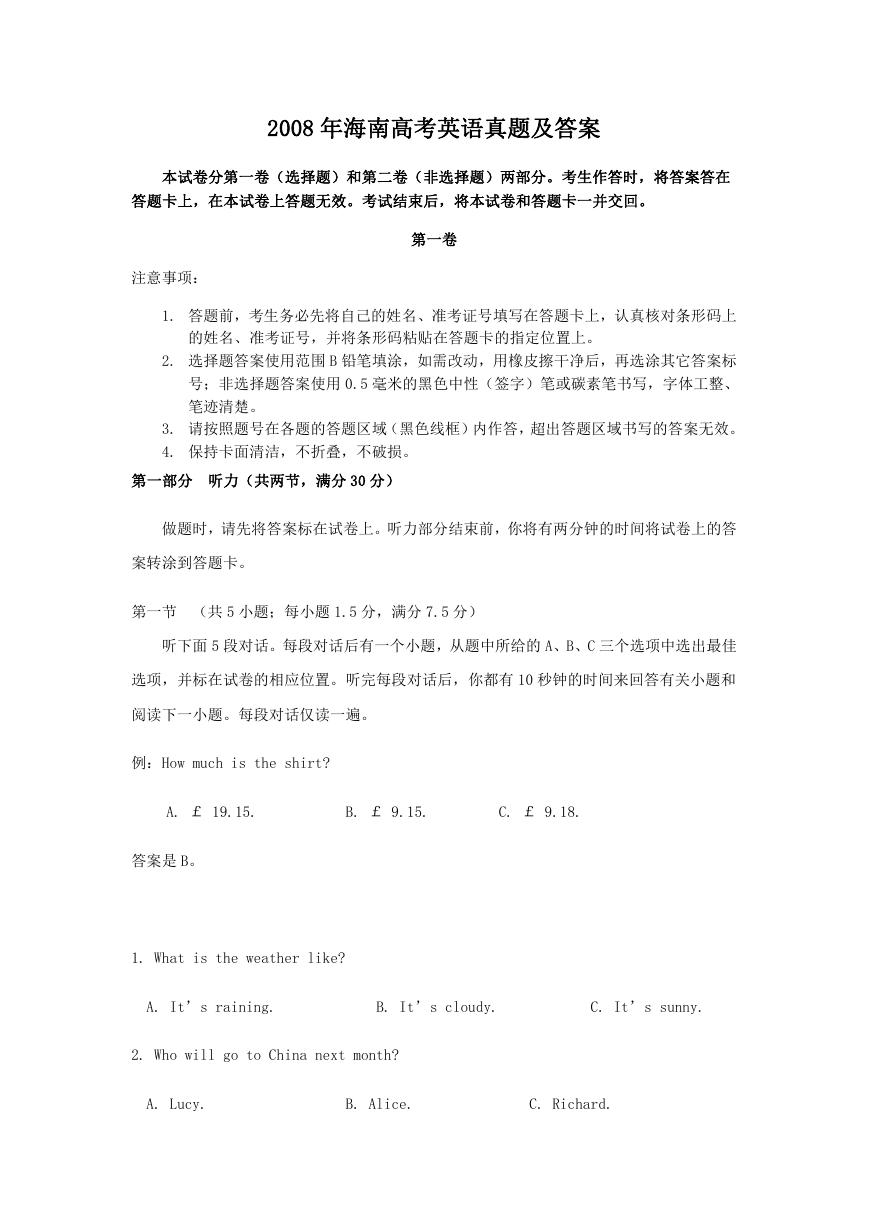
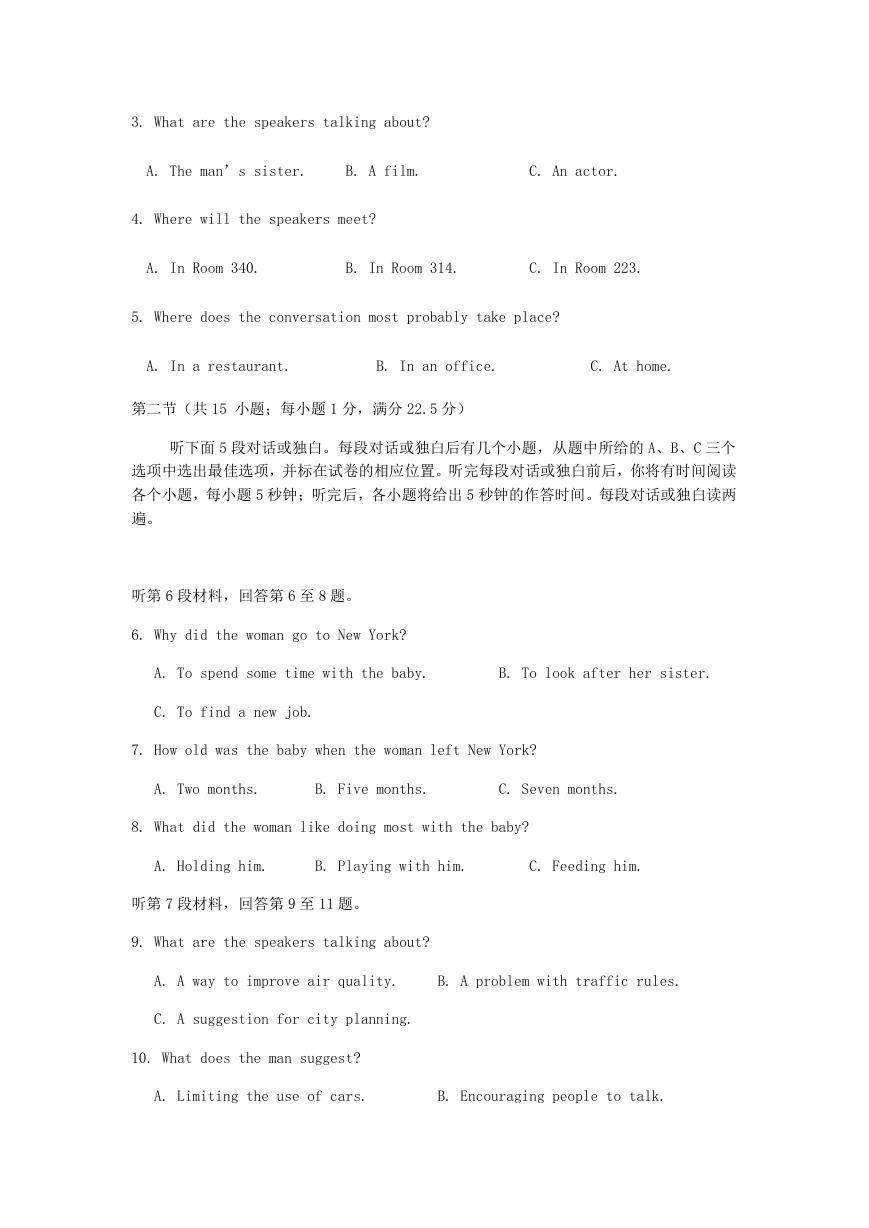

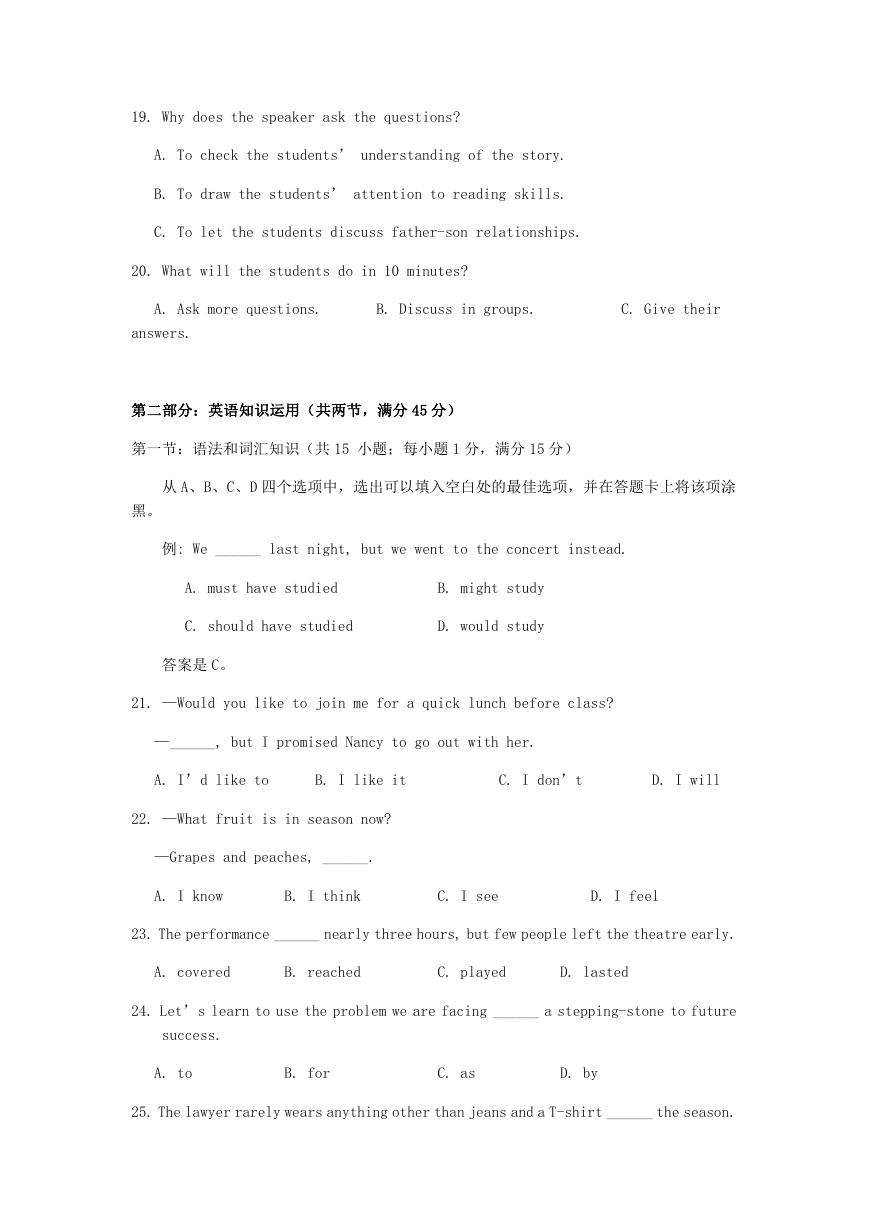
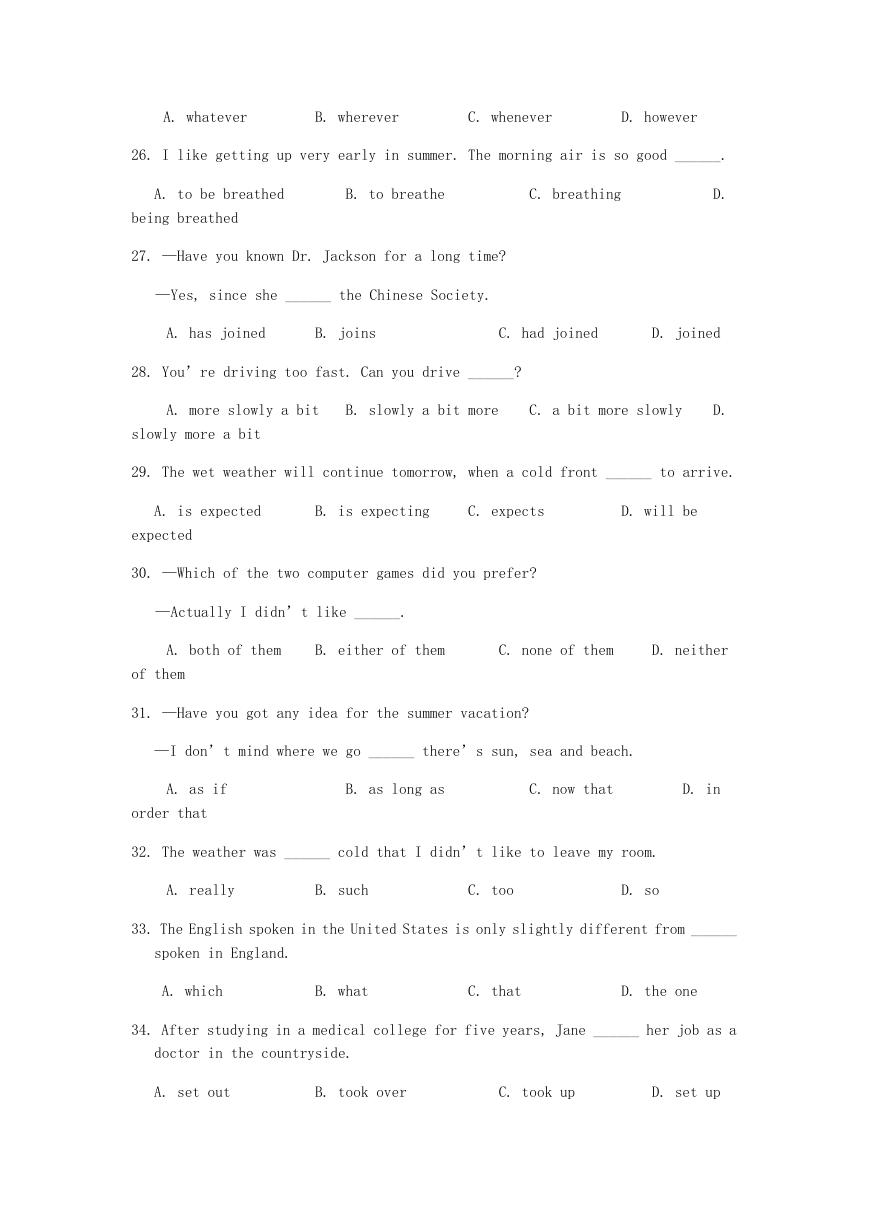
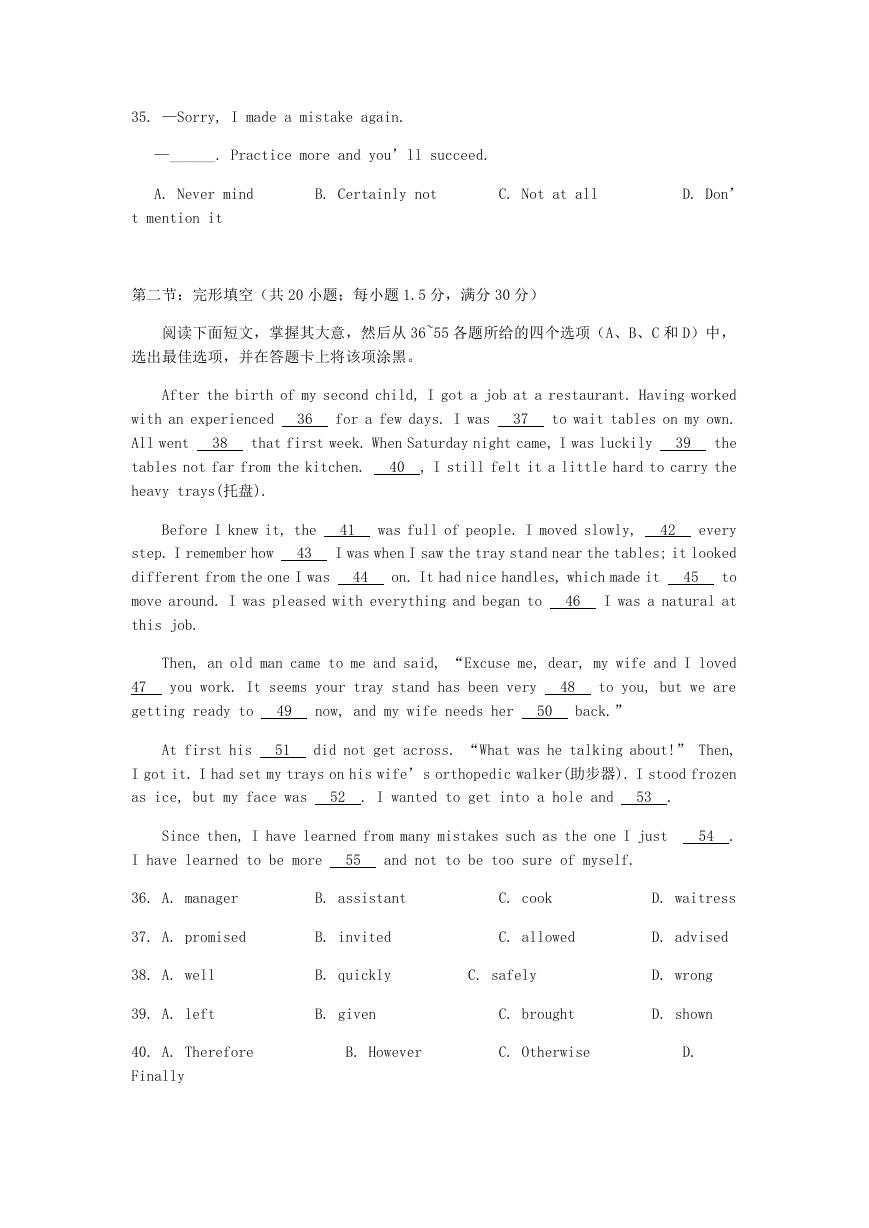










 2023年江西萍乡中考道德与法治真题及答案.doc
2023年江西萍乡中考道德与法治真题及答案.doc 2012年重庆南川中考生物真题及答案.doc
2012年重庆南川中考生物真题及答案.doc 2013年江西师范大学地理学综合及文艺理论基础考研真题.doc
2013年江西师范大学地理学综合及文艺理论基础考研真题.doc 2020年四川甘孜小升初语文真题及答案I卷.doc
2020年四川甘孜小升初语文真题及答案I卷.doc 2020年注册岩土工程师专业基础考试真题及答案.doc
2020年注册岩土工程师专业基础考试真题及答案.doc 2023-2024学年福建省厦门市九年级上学期数学月考试题及答案.doc
2023-2024学年福建省厦门市九年级上学期数学月考试题及答案.doc 2021-2022学年辽宁省沈阳市大东区九年级上学期语文期末试题及答案.doc
2021-2022学年辽宁省沈阳市大东区九年级上学期语文期末试题及答案.doc 2022-2023学年北京东城区初三第一学期物理期末试卷及答案.doc
2022-2023学年北京东城区初三第一学期物理期末试卷及答案.doc 2018上半年江西教师资格初中地理学科知识与教学能力真题及答案.doc
2018上半年江西教师资格初中地理学科知识与教学能力真题及答案.doc 2012年河北国家公务员申论考试真题及答案-省级.doc
2012年河北国家公务员申论考试真题及答案-省级.doc 2020-2021学年江苏省扬州市江都区邵樊片九年级上学期数学第一次质量检测试题及答案.doc
2020-2021学年江苏省扬州市江都区邵樊片九年级上学期数学第一次质量检测试题及答案.doc 2022下半年黑龙江教师资格证中学综合素质真题及答案.doc
2022下半年黑龙江教师资格证中学综合素质真题及答案.doc